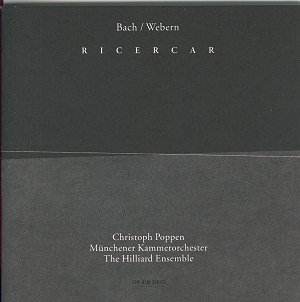Juxtapositions of ancient and modern can at times
be interesting, but at other times they may clash. This recording
includes works by Bach and Webern, in an attempt to highlight
the "connections" between the two; connections that were, obviously,
in just one direction. ECM describes this recording as follows:
"J.S. Bach's cantata "Christ lag in Todesbanden" provided a context
for "Morimur", the celebrated Christoph Poppen/Hilliard performance
of Bach's "Ciaconna" which revealed "hidden chorales." The cantata
is now at the centre of a new recording focused on connections
between Bach and Anton Webern."
There are several ways of judging a recording
like this. One can look at it from a Bachian point of view, and
judge the Bach works for their absolute value. One can look at
it from a more modern point of view, judging the Webern works
as one should; or one can try and mix the two, offering a point
of view that reflects both types of music. Yet this third choice,
arguably the most appropriate way of looking at such a recording,
is fraught with danger. For not only is the musical language of
these two composers radically different, but the critical language
is as well.
I confess to not only being unfamiliar with Webern's
music, but also to not truly considering it music, at least in
an absolute sense. While I can respect Webern as a composer forged
by his time, I cannot find much in his music that makes me want
to listen to it. The arrangement of his string quartet for chamber
orchestra - a curious undertaking; as if the string quartet itself
were not good enough - is somewhat interesting. It is less grating
than the Five Movements for String Quartet, also arranged for
string orchestra, which sound resolutely random. Yet one is hard-pressed
to find any influence from Bach in this work. Webern's orchestration
of Bach's Ricercar, from the Musical Offering, is also interesting,
but attempts to drain the music of its vital energy and fit it
into the mold of the early 20th century. Others have done worse
things to Bach's music; this arrangement is curious, in its use
of a wide range of instruments. Webern doesn't seem to want the
listener to follow the individual voices of the fugues.
As for the "real" Bach on this disc, the Hilliard
Ensemble realize an interesting interpretation of Bach's cantata
Christ lag in Todesbanden. This performance, using the
one-voice-per-part (OVPP) approach, is ground-breaking. The well-known
cantata is usually performed with a choir, but here the Hilliard
Ensemble fill all the parts with just their four voices. Many
other OVPP recordings of cantatas exist, but few have managed
the unity of sound that the Hilliards provide. While other recordings
feature four soloists, this interpretation features a group of
four singes who have been working together for more than two decades
(note, however, that the performance features three members of
the ensemble with a soprano, Monika Mauch.) The performance is
stunning. The minimal interpretation attests to the validity of
the OVPP approach, but I can understand that this recording will
shock many listeners used to hearing a choir in this work. The
haunting second movement of the cantata, a duet between soprano
and alto, is unforgettable. Fortunately, the orchestra stays out
of the way for much of the music, and does not overwhelm the soloists,
which is too often the case in OVPP recordings.
The final track on this disc is a reprise of
the Bach/Webern Ricercar, which, according to the liner notes,
"will be heard differently now, after everything that has come
before it". Um, right. It certainly is a bit different: 10 seconds
longer than the first track - but other than that I don't get
it. I guess it's a modern thing. I'm too old-fashioned to appreciate
the subtle implications of having the same work twice on a disc.
I apologize for dismissing the Webern works on
this disc so curtly, and perhaps offending believers in another
type of music. The Bach on this disc is very interesting. It would
be nice to hear the Hilliard Ensemble record more OVPP cantatas,
but perhaps without the Webern.
Kirk McElhearn
